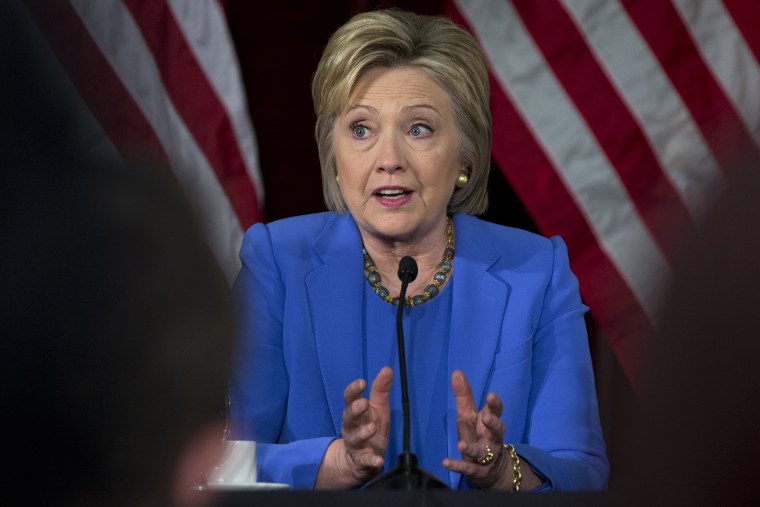Nixon was invoked. Debates were debated. Gaffes were made.
Even as Hillary Clinton gave a sober, general-election-mode speech about the the Supreme Court to start the week, her campaign seemed eager to mix it up with Team Sanders, re-energized by a trio of wins Saturday.
On dueling conference calls Monday afternoon, the top minds of both campaigns debated Sanders’ political morbidity, and sparred over which candidate is the New Yorkiest.
"Reports of our death are greatly exaggerated,” Sanders’ top strategist Tad Devine said on the first call. Nope, responded his counterpart on the Clinton campaign, Joel Benenson, later in afternoon. Our pledged lead is “nearly insurmountable,” he said.
Devine plotted a course for Sanders to overtake Clinton’s lead on June 7 in California, the final contest of the primary season. You won’t even make make it there, Benenson replied. "After April 26, there simply is not enough real estate left for Senator Sanders,” Benenson said of the day Pennsylvania, Maryland, Connecticut, Rhode Island and Delaware will hold primaries.
Well, neither candidate is going to make it with the convention with a majority of pledged delegates anyway, Devine said, so both will have to rely on super delegates. Maybe, Benenson said, but we have way, way more superdelegates.
RELATED: Does GOP infighting help Sanders and Clinton?
Sanders has “dozens” of superdelegates quietly in his corner, and more could flip from Clinton, Devine insisted. “I kind of chuckled at that,” Benson quipped, comparing the claim to “Nixon’s secret peace plan” with Vietnam, on which he failed to deliver.
But just wait for New York, which is already shaping up to be a deeply personal battle royale between native son Sanders and adopted daughter Clinton, who represented the state in the Senate for eight years.
“We're making a big commitment to New York,” Weaver said, calling Sanders the “voice of New York.” Sanders may “campaign like a Brooklynite,” Benenson replied, but Clinton is “going to campaign like a senator.” (Sanders staffers quickly mocked that one.)
Clinton has a massive lead in the polls, Weaver acknowledged, but, "we are less far behind in New York than in many states that we have won.” Benenson brushed it off, though a loss would be a huge embarrassment. "We do not envision a scenario where in New York he can dent our delegate lead significantly,” he said.
RELATED: Are Democrats still feeling the Bern?
Looking even further ahead, Sanders’ pollster Ben Tulchin said his candidate is the strongest in a general election, beating every Republican candidate by wider margins than Clinton. No way, Benenson fired back, noting Clinton won nine of 12 general election swing states that were decided in 2012 by single digits.
Sanders’ lopsided wins in Washington state, Hawaii and Alaska this weekend show he has momentum and enthusiasm, Devine said. Those were caucuses, Benenson protested, and with only two caucuses left, Sanders now needs to win primaries -- and by larger margins than he’s put up in all but two contests.
But the Clinton campaign had a more difficult time responding to Sanders’ call for another debate.
Sanders challenged Clinton to join him on the stage in New York, but Clinton has a front-runner allergy to debates. “We hope that the Clinton campaign will relent,” Weaver said.
Benenson, complaining about Sanders’ allegedly negative campaign, said the rivals approach would have to improve first. “Let’s see if he goes back to the kind of tone he said he was going to set early on. If he does that, then we’ll talk about debates," he said on CNN earlier in the day.
Then it was the Sanders campaign’s to catch flack for a revisionist take on the primary calendar.
On the conference call, Devine downplayed Clinton’s pledged delegate lead, since "almost all" of it came from states where Sanders chose not to campaign aggressively.
That may be technically true, sticking to the eight states Devine named that the campaign essentially conceded. But he lost in plenty of places he did compete aggressively as well, and the strategy cost him dearly.
Moreover, the press corps was baffled by why the campaign felt they should be given a pass for choosing to skip certain contests. But Sanders doesn’t need to convince the press, just his supporters who fund his campaign.
Still, both campaigns seemed to agree on virtually ignoring this week’s primary in Wisconsin, which was barely mentioned by either team. "We think it's going to be close," Benenson said in response to the final question on the call. "Either one of us winning by a handful of points isn't going to change the delegate math."
But not to worry, Devine said. "It's not going to get so nasty that we wouldn’t be able to put the party together."
